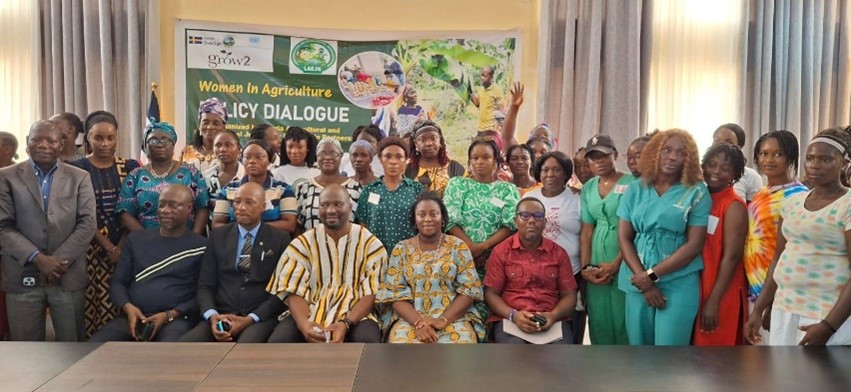The Inclusive Gender Policy Dialogue on Agriculture, held in Monrovia, Liberia, on April 14, 2024, marked a significant step towards gender equality in the Liberian agricultural sector. Stakeholders representing diverse interests, including women farmers, cooperative leaders, civil society organizations, development partners, private sector actors, and government ministries, converged to address the systemic barriers that hinder women’s participation and advancement in agriculture. Recognizing the crucial role of women in food security and economic development, the dialogue resulted in a series of concrete resolutions aimed at empowering women throughout the agricultural value chain. Organized by the Liberia Agricultural and Environmental Journalists Network (LAEJN) in partnership with the UNIDO/Grow 2 Project, funded by the Embassy of Sweden, the event fostered a constructive environment for open discussion and collaborative solution-finding.
The dialogue highlighted the persistent challenges faced by women farmers in Liberia, who often lack access to essential resources, financial services, decision-making platforms, and market opportunities. Participants emphasized the need for targeted interventions to address these structural and institutional barriers that perpetuate gender inequality within the agricultural sector. Discussions revolved around the development of inclusive policies and practical mechanisms to promote gender equity, economic empowerment, and sustainable growth. The resulting resolutions, directed primarily at the Ministry of Agriculture, provide a roadmap for transformative change within the sector.
One of the key resolutions called for the establishment of a Gender-Responsive Agricultural Financing Facility (GRAFF). This dedicated financing mechanism, to be developed in collaboration with financial institutions and development partners, aims to address the chronic lack of access to finance faced by women farmers and agribusiness owners. The GRAFF is envisioned as a platform for providing accessible credit, grants, and guarantee schemes, tailored specifically to women’s needs. It will incorporate simplified loan requirements, flexible collateral terms, and gender-sensitive risk assessments to overcome the financial barriers that have historically excluded women from accessing productive capital.
Recognizing the importance of leadership and capacity building, the dialogue also emphasized the need to empower women to take on leadership roles within agricultural cooperatives and farmer-based organizations. The Ministry of Agriculture was urged to implement a comprehensive national mentorship and capacity-building program to equip women with the skills and knowledge necessary for effective leadership. The program will include training modules on governance, cooperative development, financial management, and other relevant topics. Furthermore, participants endorsed a 50% leadership quota for women in cooperative structures to ensure gender balance in decision-making processes.
To ensure that gender considerations are integrated into all aspects of agricultural policy and planning, the dialogue called for a revision of the National Agriculture Investment Plan (NAIP) and other sectoral policies. This revision process will involve mainstreaming gender perspectives into the design, implementation, and monitoring of these policies. Specifically, it will entail establishing gender-specific goals and indicators, allocating dedicated budget lines for gender-related activities, and conducting participatory gender audits and impact assessments. These measures will ensure that agricultural policies are responsive to the specific needs and challenges faced by women farmers and contribute to creating a more inclusive and equitable agricultural sector.
The resolutions emerging from the Inclusive Gender Policy Dialogue on Agriculture were met with enthusiastic support from women farmer groups, who expressed optimism about the prospects for positive change. Monger Kebbeh, head of the Rural Women Structure, articulated the sentiments of many women farmers, stating that the resolutions offered hope that their voices were finally being heard and acknowledged. The dialogue represents a crucial step towards dismantling the systemic barriers that have historically marginalized women in agriculture and unlocking their full potential to contribute to Liberia’s food security and economic development. The implementation of these resolutions will be instrumental in fostering a more inclusive and prosperous agricultural sector that benefits all stakeholders, particularly women.
The collaborative effort demonstrated at the dialogue underscores the commitment of various stakeholders to work towards a more equitable and sustainable agricultural sector in Liberia. The resolutions, which address key areas such as access to finance, leadership development, and policy reform, provide a comprehensive framework for promoting gender equality and empowering women throughout the agricultural value chain. The implementation of these resolutions has the potential to transform the Liberian agricultural landscape, enhancing productivity, fostering economic growth, and improving the livelihoods of women farmers and their communities. The ongoing engagement and collaboration of all stakeholders will be crucial in realizing the vision of a more inclusive and prosperous agricultural sector for Liberia.


